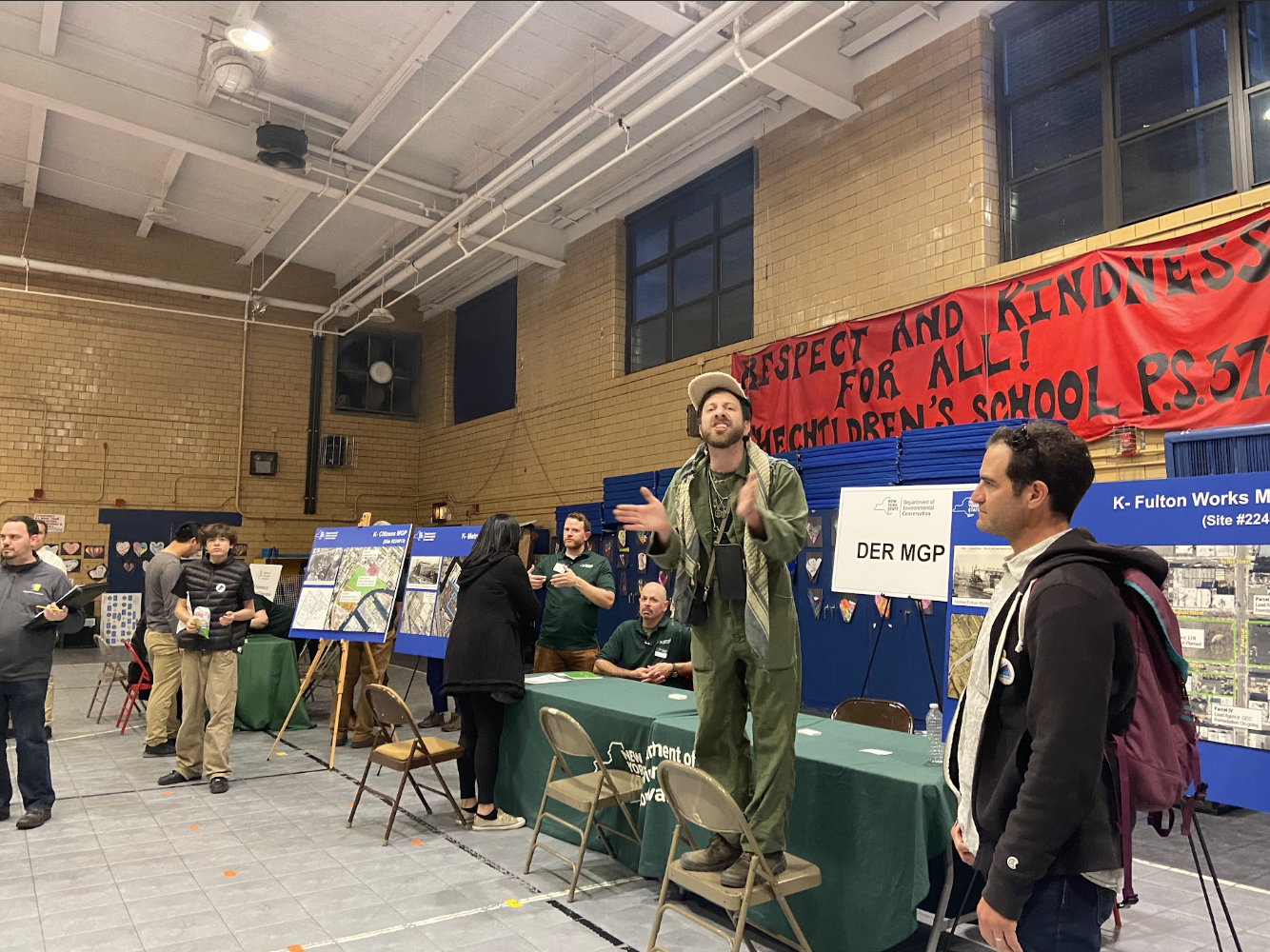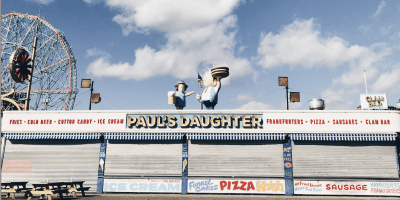'Gowanus Canal View' by danielfoster437 is licensed under CC BY-NC-SA 2.0
Two months after news about indoor air pollution in Gowanus Canal area, questions linger
Residents, officials and experts remain divided on the quality of indoor air at Gowanus businesses like Royal Palms Shuffleboard Club
On a recent Thursday night, dozens of Gowanus residents filtered into the gym of P.S. 372 for a “Community Availability Session” hosted by the Department of Environmental Conservation (DEC). The scene resembled something of a science fair, with tables and info posters lined around the perimeter of the room. But instead of kid scientists behind the tables were DEC reps in green polos, there to discuss the 49 sites in Gowanus that are part of the Brownfield Cleanup and State Superfund programs. On one of the walls hung a bright red banner with “Respect and kindness for all!” written across it in bold black lettering.
Almost an hour into the event, everything seemed to be going according to DEC’s plan, when Joseph Alexiou, author of “Gowanus: Brooklyn’s Curious Canal,” took to the center of the room to face off with department officials.
“The DEC does not want a Q&A style session here because it will cover up the lies about the amount of coal tar under the ground,” he said, getting progressively louder as he went on. “I am tired of these meetings where you don’t just answer our goddamn questions.”
The crowd formed a circle around Alexiou and the DEC officials to watch the minutes-long encounter. “Why are you building here?” one person said. “Have a real meeting,” added another.
After a few minutes Katia Kelly, a longtime member of the grassroots community organization Voice of Gowanus, stepped in to back up Alexiou. “We cannot have people go into places like the shuffleboard place pregnant, not knowing that there are fumes because you (the DEC) won’t let the community know,” she said. “This is our lives. You’re playing with our lives.”
The Royal Palms Shuffleboard Club is one of many Gowanus sites where community members want answers. The club, which has become a popular destination since opening in 2013, came under scrutiny in March when Gothamist released a story about indoor air pollution that had been detected at the club, but was never clearly communicated to Gowanus Canal residents.
According to a statement sent to Brooklyn Magazine from the DEC and the Department of Health (DOH), Langan Engineering, a contractor for the property owner, discovered levels of trichloroethylene (TCE) that exceeded the state’s Air Guidance Values in March 2021. The following month, the owner notified building tenants, including the club owners. The DEC itself alerted the public starting in June 2021 with a public notice — after the site applied to the Brownfield Cleanup Program — and posted a variety of online fact sheets. But for most locals, the Gothamist report was the first they had heard of any possible concerns.
The DEC contends that there has never been a need to shut down the club.
“It is important to stress that at NO time during the investigation and clean-up did site conditions reach a point where any use restrictions were needed,” reads a joint statement between DEC and DOH.
View this post on Instagram
According to information DOH shared with Brooklyn Magazine, Langan Engineering took four separate indoor air samples at the shuffleboard club in March 2021, one of which had levels of TCE above the state’s air guidance value. But averaged together, the levels did not exceed the “immediate action level” which would require the state to take measures to reduce exposure.
When Brooklyn Magazine shared the 2021 TCE levels reported at the shuffleboard club with experts, they expressed alarm.
“Seeing these numbers, I think, is a cause for concern,” said Dr. Dan Westervelt, an air pollution scientist and assistant research professor at Columbia University’s Lamont Doherty Earth Observatory. “No matter how you try to spin it, they are fairly high compared to the healthy standards put together based on all kinds of exposure, toxicology, and epidemiology studies.”
Trichloroethylene is an industrial solvent widely used in dry cleaning and other commercial processes. According to the National Cancer Institute, exposure can lead to kidney cancer and possibly non-Hodgkin lymphoma and liver cancer.
Patrons’ risk would depend on the level of exposure, Westervelt added, with larger implications for people who have spent more time at the shuffleboard club regularly breathing in the air. Short term exposure could still have mild effects though, he said, such as headaches or fatigue.
Voice of Gowanus recently submitted a Freedom of Information request for TCE testing results at other nearby sites to compare potential exposure, but that information could be months in coming.

Author Joseph Alexiou makes his feelings known at a recent DEC info session (Mary Cunningham)
‘Don’t go swimming in there’
Since the initial news broke, there have been a mix of reactions, with some forgoing the club, and others continuing to frequent it. It has also prompted some to think more deeply about what it means to live and spend time in Gowanus.
Ryan Keenan, a 30-year-old who works part-time in film and television, moved to Bond Street with his partner in October 2022. At the time, his friends teased him about his new apartment’s proximity to the Canal. “Don’t go swimming in there,” they said. “It’s super dirty.”
Keenan, who has chronic Lyme disease and a partner who is also chronically ill, said he’s been on a healthy track the last couple of years and wants it to stay that way. “This situation is especially important to me and my partner because we both are sensitive to environmental pollutants and toxins,” he said.
He wants to look closer at the data before he decides exactly how he feels about the situation.
“At the very least, I’ll move out at the end of my lease, which is a year long,” he said. “If I do, upon further investigation, see data that is worrisome or points concretely in the direction of hazard then I’ll go.”
As a senior attorney for Earthjustice’s Toxic Exposure and Health Program, Jon Kalmuss-Katz is familiar with the risks associated with TCE. Kalmuss-Katz, who lived at 571 Union Street before the Royal Palms Shuffleboard Club opened across the street in 2013, said he is most concerned about the workers who were at the Royal Palms on a regular basis and people living and raising kids in the neighborhood.
“The same groundwater that is underneath Royal Palms is going to be underneath the other buildings in the area. This is a block which has many single family homes where people have lived for decades,” he said. “These people are going to be exposed to the exact same type of groundwater contamination as was detected in that building.”
Brooklyn Magazine reached out to three former employees and two current employees for this story but did not receive any responses.
Although the DEC maintains that it alerted the public starting in June 2021, some people feel the DEC’s communications did not go far enough. Out of the seven Brooklyn residents interviewed for this story, no one was aware of contamination at the site until the Gothamist story broke on March 9, 2023 — nearly two years later.
“It’s absolutely shocking that the Department of Environmental Conservation knew that this indoor air was contaminated in April 2021 and didn’t tell the public,” said Walter Hang, president and founder of Toxics Targeting, an Ithaca-based environmental database firm. Hang has been working with Voice of Gowanus to get information out about the contamination at 514 Union Street.
Even if residents did have access to DEC’s data, it is very complicated, said Hang, which would make it difficult for the average person to parse through. “These citizens in the Gowanus canal community really had no idea what was going on,” he added.
As a scientist who studies this type of exposure, Westervelt said even he had a hard time piecing everything together. “In many cases, including this one, there are improvements that should be made on the way it’s communicated.”
Zach Bugge, 28, has been a regular visitor of the club since 2017. In 2021, Bugge and some friends signed up for a weekly shuffleboard club league. He was surprised when he saw the Gothamist story, but emails from the league quickly assuaged his concerns.
One of the correspondences contained a March 2023 letter from the DEC to Jonathan Schnapp, co-owner of the shuffleboard club, reassuring him that indoor air exposure to TCE and PERC were mitigated by the installation of a soil vapor intrusion (SVI) mitigation system, completed in September 2022. Based on the levels of toxins detected and the unlikeliness of long-term exposure, DEC said it did not require any restrictions.
Recent media stories are wrong & refused to use info provided. At 514 Union St, like all brownfield cleanups, DOH & DEC experts worked to reduce potential exposure to contamination. A vapor mitigation system was installed to prevent exposure to TCE/PERC.
— New York State Dept. of Environmental Conservation (@NYSDEC) March 19, 2023
In a written statement provided to Brooklyn Magazine, Schnapp said “The DEC has made it very clear that the Royal Palms was and continues to be safe for both staff and visitors. We encourage everyone to get their information from their qualified experts rather than the bad faith pseudoscientists peddling misinformation to the detriment of our community.”
A former business owner who owned a shop down the street from Royal Palms echoed Schnapp’s sentiments. “I tend to agree with him,” said this person, who declined to be identified for this article. They said the DEC had been in contact with their business as well and that they were never particularly concerned about the TCE levels. “Testing has been going on for years.”
As far as Bugge is concerned, he plans to continue visiting the club. “I figured that if they hadn’t shut it down, then that they were doing what was considered safe by the DEC,” he said. Other league members also seem to be on the side of the shuffleboard club, according to Bugge.
From Superfund to super future?
While not everyone might be ready to pack up, the news has prompted residents to consider Gowanus’ industrial past and what that it might mean for the area’s future.
The canal, deemed a Superfund Site in 2010, has been the receptacle of toxic waste disposal for decades, leading the EPA to designate it as one of the nation’s most seriously contaminated water bodies. All the while, the neighborhood has undergone major changes. In 2021, the New York City Council passed a bill from Mayor Bill de Blasio to upzone 82-blocks in new housing, opening the door for thousands of new apartments to be built.
Development firm Avery Hall is in the process of building a rental complex with 350 units directly around with shuffleboard club, with construction expected to wrap up in 2025. According to their website, “the project is intended to be remediated and developed as a multi-phase, mixed-use and mixed-income rental development.”
With new developments swiftly popping up across the neighborhood, some worry about how unremediated parcels of land could affect future generations.
“The development of Gowanus, if it is going to occur, it has to occur in a way that is safe for the community and for the people that have lived there for decades,” said Kalmuss-Katz, the environmental lawyer. “This isn’t just a risk that people have to accept because they’re living in a formerly industrial area, right next to a Superfund site.”
The neighborhood’s reputation as a toxic hotspot hasn’t deterred all neighborhood residents. Bill Gorman, a 69-year-old retired Catholic School teacher, has lived on Degraw street for his entire life and said three generations of family before him have lived long lives. He welcomes the development and the diversity of people that it’s brought to the community.
“Certainly today, it is 100 times better than it was,” he said.
As for Royal Palms, Schnapp said the shuffleboard club recently signed a brand new 10-year lease and “are excited about the prospect of being a constant pillar of this community for years to come.”
More information about environmental remediation at 514 Union Street can be found here.
You might also like 


























